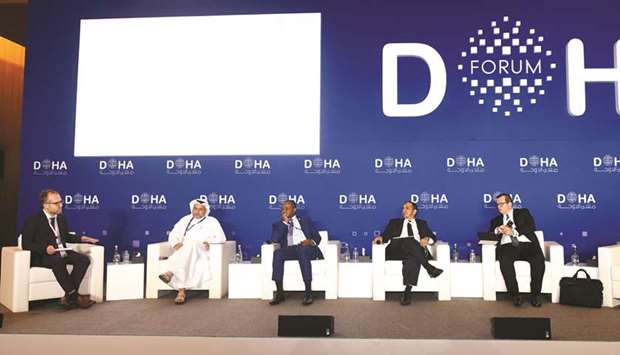With more than $127bn Islamic financial assets under its kitty, Qatar has taken the lead in reaching out to Malaysia and Turkey through which the country aims to be the dominant player in the global Shariah financial landscape.
“Qatar has more than $127bn of Islamic financial assets, most of which is concentrated in Islamic banking ($107bn) and outstanding sukuk (Islamic debt) of $20bn,” Qatar Financial Center (QFC) Authority chief executive Yousuf Mohamed al-Jaida told Doha Forum yesterday.
Highlighting that the country’s Islamic macro-fundamentals are strong and robust, he said Qatar has the vital ingredients of assets and infrastructure (legal and regulatory frameworks) to enable it take the lead in the Islamic finance globally.
The QFC has set an ambitious plan to reach out to Malaysia and Turkey to create some sort of consortium for Islamic financial activities, he said.
“We have a vision to cover the entire globe’s Islamic financial transactions between three financial centres - Doha, Istanbul and Malaysia,” he said, adding for which there is a need to share platforms and technology.
Under the proposed plan, Turkey would cover Islamic finance needs in Europe, Qatar would serve the greater Middle East and North Africa and Malaysia will continue to serve the Asian markets.
The London Stock Exchange is currently a global venue for the issuance of sukuk, while Hong Kong and Luxembourg have also made inroads but Qatar believes the market should be led by Muslim countries, al-Jaida said.
“If we put our heads together and share technology and come up with regulatory requirements and pass-porting mechanisms, we believe that these three countries can dominate the entire Islamic financial market internationally,” al-Jaida said.
The Islamic financial system is now regarded as one of the fastest growing segments of the global financial system - offering as a safer and more ethical alternative to conventional banking. The industry’s growth has been buoyed by recent investments in infrastructure, sukuks, capital market products, and the adoption of financial technology.
Dr Mohamed Damak, senior director, S&P Global Ratings, said the Islamic finance industry, which is $2.2tn in size now, has been witnessing slowdown recently.
“We estimate the growth to be mid-single digit in 2019 and to be similar for the next year too,” he said, comparing it with the double-digit expansion experienced by the industry between 1975 and 2010.
Stressing that the (Islamic finance) industry is concentrated by geography and business line with the Gulf countries, Iran and Malaysia accounting for 80% of the assets, he said the slowdown in the Gulf economies (owing to weaker commodity prices) had its toll on the Islamic finance industry too.
Dr Bello Lawal Danbatta, secretary general, Islamic Financial Services Board, said Islamic banking assets are currently $1.7tn, sukuk issuances were to the tune of $470bn last year and takaful is at present $48bn and has been steadily growing.
However, looked from the year-on-year growth of Islamic banking assets for 2017-18 which was mere 0.9% compared to 27-28% in the capital market sector; he said it appears that the former is not growing.
Dr Mohamad Akram Laldin, executive director, International Shariah Research Academy for Islamic Finance, said sukuk issuance in Malaysia surpassed that of conventional instruments.

Yousuf Mohamed al-Jaida, along with other panellists, at Doha Forum yesterday. PICTURE: Shemeer Rasheed

